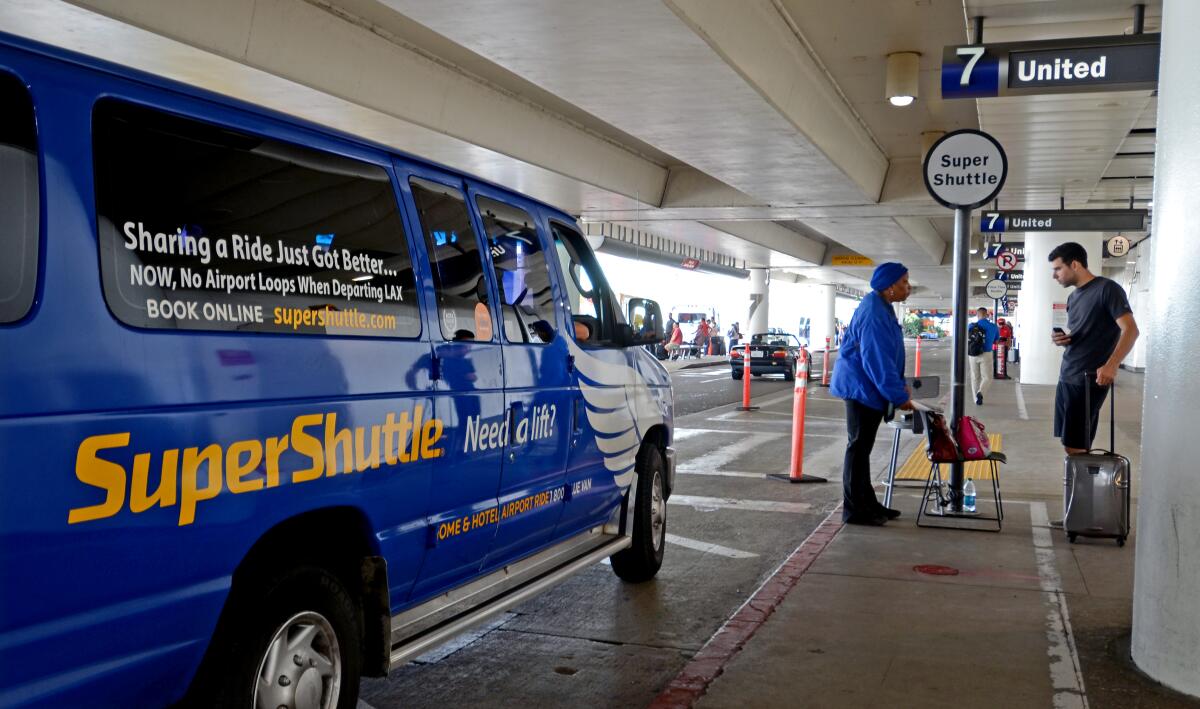SuperShuttle announces it’s ending operations Dec. 31

SuperShuttle, the shared van ride that has served passengers heading to and from airports nationwide, including Los Angeles International Airport, as well as in Latin America, Canada, Europe and Asia, will cease operations at the end of the year.
The company, born in 1983 to serve Los Angeles International Airport, has been plagued by competition from Uber and Lyft. In recent weeks it has pulled out of airports serving many cities, including Burbank, Sacramento, Phoenix, Baltimore and Minneapolis.
A Tuesday letter from the company to a Los Angeles-area franchisee, obtained by The Los Angeles Times, says: “SuperShuttle plans to honor all reservations and walk-up requests for service” through Dec. 31.
Attempts to reach Mark Friedman, identified as general manager in the letter’s signature line, were unsuccessful Thursday. SuperShuttle executives could not be reached for official comment. But two SuperShuttle reservations agents reached by telephone confirmed that the company was going out of business, as did a company executive who was not authorized to speak publicly.
SuperShuttle is one of the few services that can still pick up riders curbside at LAX after the airport’s recent changes to help ease congestion. In November, Lyft, Uber and taxis were relegated to a pickup lot next to Terminal 1; travelers can either walk there or wait for an airport shuttle to ferry them.
But shared van services such as SuperShuttle have been hit hard since the advent of ride-hailing services. At LAX, shared van rides plunged by two-thirds in the first half of this year compared with the first half of 2016, the first full year that Uber and Lyft operated there, according to city data. Trips on LAX’s FlyAway buses also sank by two-thirds during that time; taxi trips fell 39%; and courtesy shuttles to car rental facilities, parking lots and hotels saw a 20% decline. The number of Uber and Lyft trips, meanwhile, more than doubled.
The letter to the franchisee cited “a variety of factors” for the company’s closure, “including increasing costs and changes in the competitive and regulatory landscape” that “have called into question the economic and operational viability of the company’s operations.”
SuperShuttle ran into problems before the Thanksgiving holidays at LAX, suspending operations there because of an issue with insurance. The California Public Utilities Commission said the service was out of compliance with state regulations. The issue was resolved Nov. 21.
The company stopped operations at Hollywood Burbank Airport at the end of November, terminating the contract with the airport’s authority, airport spokeswoman Lucy Burghdorf wrote in an email Thursday.
SuperShuttle is owned by an affiliate of Blackstreet Capital Holdings, a private investment firm based in Bethesda, Md., court documents show. Blackstreet describes itself as specializing in acquiring small or mid-size firms “that are in out-of-favor industries or are undergoing some form of transition.”
Blackstreet acquired SuperShuttle in September from Transdev on Demand Inc., which is part of the Transdev Group of France, according to a lawsuit Transdev filed against Blackstreet this month in Delaware Chancery Court in a dispute over some terms of the transaction.
Officials at Blackstreet could not immediately be reached for comment on SuperShuttle’s suspended services or on how SuperShuttle’s services are divided between company-owned operators and franchisees.
SuperShuttle’s website shows that the firm provided service to more than 80 airports worldwide, including those in Southern California, before the firm began suspending services in many locations.
The company’s demise comes less than a year after it won a labor victory that made it easier to classify its drivers as independent contractors rather than employees. A January ruling by the National Labor Relations Board sided against SuperShuttle drivers at Dallas-Fort Worth airport who were looking to unionize.
Support our coverage by becoming a digital subscriber.
Hamm and Forgione write for the Los Angeles Times. Times staff writers James F. Peltz, Priscella Vega and Laura Nelson contributed to this report.

